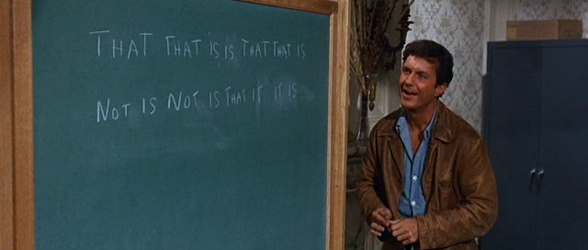Blogs are for dummies. Dumbed down. Bolden and linked. Dck jcks. Fragmentary sentences in broken textspeak. Bloggers on pop sites talking down to you like u’re a t33nagr. It’s the new Tee Vee. And even better: it gives you the illusion of more control when you actually have less. The Net wasn’t designed to enlighten you, but rather to make you its bitch—to use the language of the Netscape.

This here blog is six years young, which is actually quite old in Net time, and probably too esoteric for its own good, though it does rely on the memes of the Net—the colorful jay-pegs and dragable widgets hung on the wall, the cozy youtube player centered on the post, the obscene sarcasm that some would mistake for wit, and all of it lost in the author’s neurosis—a sonic vision more reflective of their own sick desires than a reflection of the world.
Today’s high-speed Net favors lickety-quick, disposable content, both on the surfer end—because we demand instant gratification—as well as by the content creators who dumb everything down for what is believed to be the common denominator—a dummy. Does Hollywood make dumb movies catered to the needs of the international market, or do they set the agenda, knowing that the “useless eaters” (to borrow a Kissinger phrase) in America and China and everywhere in between are so dumb that they’ll eat anything you throw at them? They’re both probably true, and this here author is no better. That ain’t no humblebrag; I’m actually very stupid.
Lo these six years, this blog has had one simple purpose: to inspire musical thought. Whether you’re a composer or listener, musical imagery is a fine thing; along with the smile of a babe and the singing of wine glasses, it’s one the finest things in life.
The Inner Game
As it states in The Inner Game of Kickball, if we’re gonna get good at kickball, we should play with kids who are older and better than us. In this way, we attain mastery. To use the terms of the book, we allow our Self 1 to take a backseat while our Self 2 takes over. Self 1 is your consciousness: the bright vibrating space of your mind. Self 2 is your unconscious: the bottomless pit of your brain, the great abyss of your body. Self 2 is infinitely smarter than Self 1, but Self 2 is only good at sports and playing the violin. Self 1 can write music, listen to music, and tell you it loves you.
When seeking mastery, we must always return to our zen mind beginner’s mind, to the simplicity of our Self 2s. Just as the mind should be polite to the body, the body should seek not to offend the mind. In this way, we become a kind of Self 3 and attain a level of mastery. (Ibid.)
This blog never aims to speak down to you, dear reader, like your some goddamn teenager, but rather to treat you like a friggin’ genius, possessed by little genies, genuinely dreaming and certainly seeming to enjoy your Self 1.
So here’s Los, reminding you to see sharp and be natural.
After the jump:
What do you think; do you like to let your stupid show, let it hang out all over the place, in order to learn and grow and become better than everyone else? Or would you have liked an actual list of thirteen items as promised by the title bait?
Top 13
1.Major Sevenths – the one that started it all.
2.Owlisimo – Stravinsky’s inspiration for this blog
3.Crying Codas – nothing makes a man cry like a coda
4.Never Jam After Midnight – an interesting choice perhaps. but the jam is the tightest on the site.
5.The Bleep – the tone matches the tone. and i do love profanity.
6.Musical Phone Tones – the strange dissonance of the bitonal telephone and a killer scene from short circuit 2.
7.The Mourning Dove – this bird is great and so is Stevie Nicks.
8.Audience Licks – a topic that is very dear to me. underrated post.
9.Adult Sing-Alongs in Contemporary Film – another one that is too serious for words.
10.Bar-Mangled Banner – a light-hearted one. and who doesn’t love a good musical boner?
11.American Indian War Chant – probably the best widget here. this should be higher up.
12.Sporting Even Melodies – let’s face it. music = sports.
13.The Train in Spain Falls Majorly on the Fade – a classic widget. classic bloggies.
Coming up next: 11 Ways to Play Music in the Nude
 Proto Man is the cowboy-samurai with a whistle of pure gold. A robo-desperado with the byte motif. He’s also Mega Man’s cooler older brother as is evident by his supercool scarf, sunglasses and shield.
Proto Man is the cowboy-samurai with a whistle of pure gold. A robo-desperado with the byte motif. He’s also Mega Man’s cooler older brother as is evident by his supercool scarf, sunglasses and shield. 


 Beginning on Middle C, moving up a fourth to an F, followed by a broken octave of B-flats, then another fourth between the A-flat and D-flat, transposed up a half-step from the D-flat, up to the D and A for a final fourth interval moving down now, and the last tritone between the flat-A and final D, so as not to resolve too perfectly.
Beginning on Middle C, moving up a fourth to an F, followed by a broken octave of B-flats, then another fourth between the A-flat and D-flat, transposed up a half-step from the D-flat, up to the D and A for a final fourth interval moving down now, and the last tritone between the flat-A and final D, so as not to resolve too perfectly.


